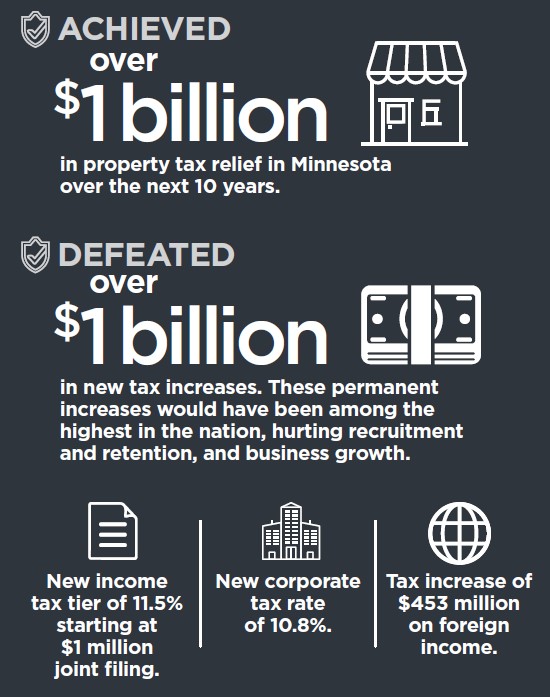2023 Key Issues: Tax competitiveness
Ensuring Minnesota's tax climate supports long-term success.
The Chamber focused on speeding Minnesota’s economic recovery by helping business fully reopen; providing relief to hard hit industries and preventing additional cost burdens on employers, as the state comes off the worst economic downturn in over 70 years. A top priority was federal tax conformity to prevent a $409 million state tax hit for the over 190,000 Minnesota businesses that received federal Paycheck Protection Program (PPP) loans. PPP helped to retain employees during the worst of the COVID-19 pandemic, and keep their businesses operational. The Senate passed the PPP conformity bill in early March, but the House delayed until late in session and only included partial conformity.

The Chamber strongly opposed permanent tax increases proposed by the governor and House Democrats that would have made Minnesota a tax outlier both nationally and internationally and slow Minnesota’s economic recovery by discouraging investment, talent recruitment and retention.
Final budget and tax bills were passed in a June special session with no new taxes; 9.5% growth in spending of $4.5 billion; $754 million in tax relief including full conformity with PPP loans; $491 million increase transfer to the budget reserve; $500 million in federal funds for the governor to spend; and $1 billion of the federal funds left on bottom line for legislators to allocate in the 2022 session.
The Chamber's Beth Kadoun advocates for a tax extension for Minnesota businesses during the 2020 legislative session.
Return on investment for your Minnesota Chamber membership

Our work gets results
- Passed section 179 tax relief to help small businesses and farmers.
- Saved $1,580 in business property taxes per million dollar property.
- Prevented $13,000 in tax increases per business in Minnesota.
- Prevented a .6% payroll tax increase on employers.
Our key priorities for the 2023 session include structural tax reforms to spur more robust economic growth
2023 priorities include:
- Reducing Minnesota’s individual income tax rates to get out of the top ten highest in the nation in order to improve competitiveness of pass-through businesses and to encourage talent, investment and economic growth.
- Reducing Minnesota’s uncompetitive regressive corporate income tax rate to get out of the top ten highest in the nation in order to improve business competitiveness, private sector investment and economic growth.
- Providing property tax relief by lowering the state business property tax levy, an extra tax assessed on businesses that results in the high fixed cost of doing business in Minnesota.
- Encouraging innovation, entrepreneurship and productivity growth through enhancing research and development tax credit, angel investment tax credits, and providing incentives for investments in Minnesota-based operations.
- Conforming to the federal estate tax threshold to remove the high financial disincentive to remain in Minnesota and to reduce barriers for transfers of family farms and businesses.
We oppose tax increases that undermine Minnesota’s competitiveness and hinder economic growth. We also support reducing taxpayer administration compliance burdens, improving taxpayer procedural protections and providing clear release guidance to taxpayers.
Make your voice heard

Make sure you're signed up for action alerts, join a policy committee or interact with legislators during 2023 Chamber Day at the Capitol! It's important for legislators to know how their actions impact Minnesota employers and employees.





